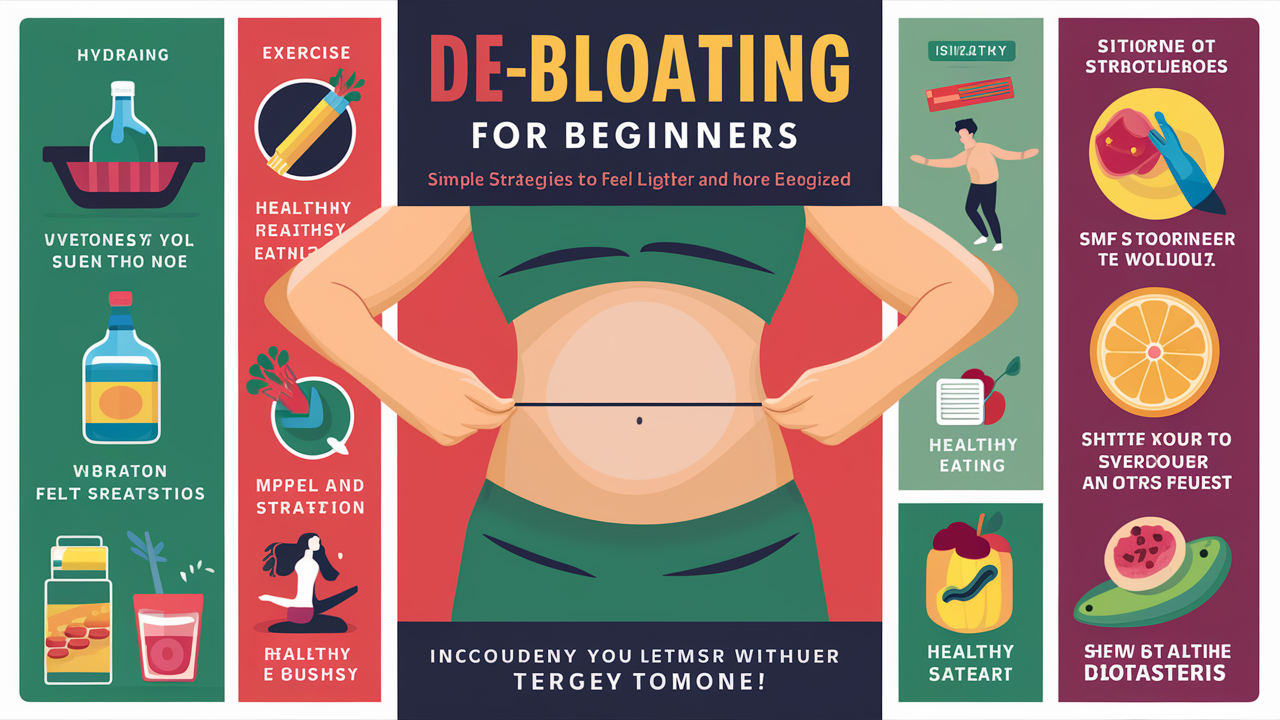
Table of Contents
De-Bloating Feeling puffy, sluggish, and uncomfortable after a meal? You’re not alone. Bloating is a common digestive issue that can significantly impact our comfort and well-being. While occasional bloating is normal, persistent bloating can be a sign of underlying issues or simply a result of dietary habits. This blog post dives into the world of de-bloating, exploring the causes of bloating and equipping you with simple strategies to feel lighter, more energized, and back in control of your digestive health.
Understanding Bloating: Beyond the Bulging Belly
Bloating is a sensation of abdominal fullness or tightness often accompanied by gas, pressure, and discomfort. It can be caused by various factors, including:
- Excess Gas Production: When bacteria in your gut ferment undigested carbohydrates, gas is produced as a byproduct. This gas can distend your abdomen and lead to bloating.
- Swallowing Air: Talking while eating, drinking carbonated beverages, or chewing gum can lead to swallowing air, which gets trapped in your digestive system and contributes to bloating.
- Constipation: When stool builds up in your intestines, it can cause a feeling of bloating and discomfort.
- Food Intolerances or Sensitivities: Certain foods, like dairy or gluten, can trigger an inflammatory response in some individuals, leading to bloating and other digestive issues.
- Hormonal Fluctuations: Women may experience bloating during menstrual cycles due to hormonal changes that affect digestion.
- Stress: Chronic stress can disrupt gut motility and contribute to bloating.
Identifying the Culprit: Decoding Your Bloating Triggers
The first step to de-bloating is identifying the root cause of your discomfort. Here are some tips:
- Keep a Food Diary: Track your meals and snacks, along with any bloating you experience. This can help you identify potential trigger foods.
- Pay Attention to Timing: Do you experience bloating after specific meals or throughout the day? Observe patterns that might point to a particular food group or habit.
- Elimination Diet: Consider an elimination diet under the guidance of a healthcare professional. This involves temporarily removing certain food groups and reintroducing them one at a time to pinpoint potential intolerances.
De-Bloating Strategies: Tame the Tummy Rumble
Once you have a better understanding of your triggers, here are some simple strategies to combat bloating:
- Mindful Eating: Slow down, chew your food thoroughly, and avoid distractions while eating. This promotes better digestion and reduces air intake.
- Identify Your Fiber Intake: While fiber is essential for gut health, excessive fiber intake, especially from certain sources, can contribute to bloating for some individuals. Experiment with different types of fiber and find the amount that works best for you.
- Choose Gut-Friendly Foods: Certain foods like yogurt, kimchi, and kombucha are rich in probiotics, which are beneficial bacteria that support a healthy gut microbiome and can aid digestion.
- Hydration is Key: Drinking plenty of water throughout the day helps your body break down food and move it through your digestive system more efficiently. Aim for eight glasses of water per day, adjusting according to your individual needs and activity level.
- Limit Gas-Producing Foods: Certain foods, like beans, cruciferous vegetables (cauliflower, broccoli), and onions, are known to produce gas. Consider limiting these foods or consuming them in smaller portions.
- Manage Stress: Chronic stress can wreak havoc on your digestive system. Practice stress-management techniques like yoga, meditation, or deep breathing exercises to keep stress in check.
- Natural Remedies: Ginger tea, peppermint tea, and fennel seeds have been used traditionally to soothe digestive discomfort and may help with bloating.
Lifestyle Modifications for a Happy Gut
Beyond dietary strategies, here are some lifestyle modifications that can contribute to a happy gut and reduced bloating:
- Regular Exercise: Physical activity helps move food through your digestive system and can alleviate bloating. Aim for at least 150 minutes of moderate-intensity exercise or 75 minutes of vigorous-intensity exercise per week.
- Get Enough Sleep: Aim for 7-8 hours of quality sleep each night. Sleep deprivation can disrupt gut motility and contribute to digestive issues.
- Limit Processed Foods: Processed foods often contain ingredients like artificial sweeteners, additives, and unhealthy fats, which can disrupt gut health and contribute to bloating.
- Don’t Skip Meals: Eating regular meals helps keep your digestive system functioning optimally.
The Takeaway: Embrace Long-Term Solutions
While de-bloating techniques can offer quick relief, remember that sustainable solutions are key. By identifying your triggers and incorporating these tips into your daily routine
By identifying your triggers and incorporating these tips into your daily routine, you can cultivate a healthier gut environment, experience less bloating, and feel lighter and more energized. Remember, consistency is key. Be patient with yourself, experiment to find what works best for your body, and celebrate small victories along the way.
Empower Yourself with Knowledge:
- Websites:
- National Institute of Diabetes and Digestive and Kidney Diseases: https://www.niddk.nih.gov/health-information/community-health-outreach/information-clearinghouses
- Harvard School of Public Health: https://hcmph.sph.harvard.edu/
- Books:
When to Seek Professional Help
If you experience persistent bloating that significantly impacts your daily life or is accompanied by other concerning symptoms like severe abdominal pain, bloody stools, or unexplained weight loss, it’s crucial to consult a healthcare professional. They can help identify the underlying cause of your bloating and recommend appropriate treatment options.
Embrace a Balanced Approach to De-Bloating
De-bloating isn’t about fad diets or quick fixes. It’s about nurturing a healthy gut environment, making mindful dietary choices, and prioritizing your overall well-being. By incorporating these strategies, you can embark on a journey towards a happier gut, reduced bloating, and a more energized and comfortable you.
Bonus Tip: The Power of Relaxation
In today’s fast-paced world, chronic stress can take a toll on our digestion. Taking time to relax and de-stress can significantly improve gut health and alleviate bloating. Consider incorporating relaxation techniques like yoga, meditation, or deep breathing exercises into your routine. Even a few minutes of mindful relaxation can make a big difference.
Remember: You are not alone in your journey to de-bloating. With a little awareness and these simple strategies, you can take control of your digestive health and experience the joy of feeling lighter, more energized, and back in control of your body.
